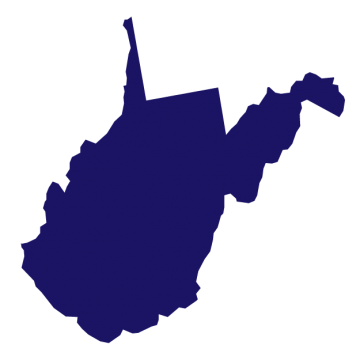
In what is still a very New Year, another state has stepped up with plans to regulate online casino gaming and poker within its borders. This one goes beyond the discussion stage, however, as an actual bill has come forth.
The state of West Virginia isn’t monstrous by any stretch, but it would be able to generate some revenue with an intra-state online gaming network. In October of last year, legislators were discussing the issue amongst themselves and, from those talks, it appears that a new piece of legislation is on the floor in Charleston. That bill, known as House Bill 3067, is sponsored by State Delegate Shawn Fluharty, who was a key player in the discussions in the Mountain State back in October, and four other Delegates – Sean Hornbuckle, Mike Puskin, Joe Canestraro and Mick Bates.
The bill isn’t a half-hearted attempt either. It would open West Virginia for full online casino gaming and online poker and at a price that would be of interest to potential licensees. The license fee for an operator would be $50,000 and taxation would be 14% on gross revenues from the online operators. It also would introduce stiff penalties – a year in jail and/or a fine up to $150,000 for a first offense – for those who provide online gaming to West Virginians if the legislation is passed.
When discussions were heating up in late 2017, this bill was being passed around by Fluharty, a Democrat, but it wasn’t taken seriously. The Republican House Speaker, Tim Armstead, flatly rejected introducing it to the legislature. There are things that have changed, however, that might make it easier to consider the bill in 2018 and increase its chances of passage.
First, instead of getting the bill in front of the eyes of his peers at the end of the session, Fluharty and his other sponsors are getting it into action early in this legislative session. Additionally, although Armstead didn’t bring the bill into the House, he has stated that it was simply a matter of timing and not a deep-seated fundamental position against the issue. But the real bottom line could literally be the bottom line.
When West Virginia introduced casino gaming to the region in the 1990s (Mountaineer Casino), it was the only game in town. Since those days, however, four more casinos have joined Mountaineer in the casino industry in West Virginia. That has had a noticeable effect on the revenues for the state’s coffers.
In 2017 (from January to October), the state’s “win” on the five casinos was around $500 million, a 7% drop when compared to the previous year time frame. In 2016, the “win” was $638 million, but it was still around 2.5% less than what the state took in during the 2015 calendar year. The decline in casino gaming goes back to the mid-2000s, when the state of West Virginia took in over a billion dollars from its casinos.
Why the decline in revenues? Back in the mid-2000s, there was no competition for the operators in West Virginia. Fast forward the clock to 2018 and not only are there five casinos competing in West Virginia (a state of 1.8 million citizens) but there are also more casinos outside the West Virginia borders. Pennsylvania, Maryland and Ohio have all opened their own casinos – approximately 30 of them – that have definitely taken some of the steam from the sails of the West Virginia operations.
With online casino gaming and poker, West Virginia would just be looking to protect its own interests and revenues. With online gaming and poker’s passage in Pennsylvania, it would become even tougher to keep West Virginians in the state and on the state’s games. The bottom line would indeed be the bottom line – revenues for the state.
There are other states that are looking to open online gaming industries of some sort within their borders. Up to now, it has been thought that New York would be the next state to pass online gaming and/or poker regulation, with Michigan also in the running. With a bill on the floor, however, West Virginia is moving up quickly and must be looked at as another positive step forward for online gaming and poker in the States of America.















